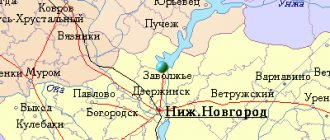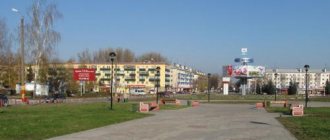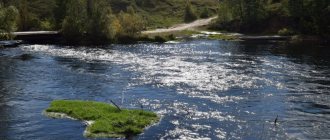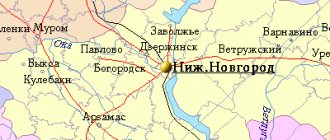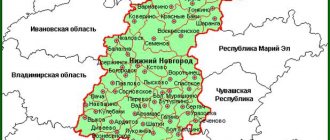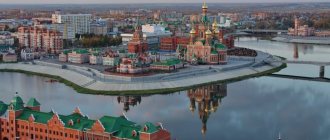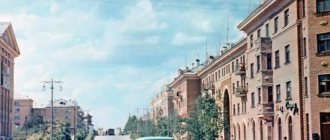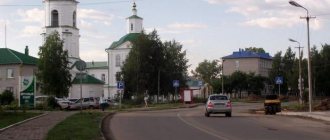Since last fall, in the village of Bolshie Otary, Voskresensky district, Nizhny Novgorod region, Ilya Smolin, an employee of the Museum of Wood Culture, began building a boat based on ancient replicas - the image and likeness of the ships that once sailed along the rivers of the Middle Volga region. A little later, the idea of the original project “All Vetluga – 2020” arose.
Back in April, in deep water, tourists had to raise their sails and set off on a long voyage. A pandemic intervened, which thwarted the original plans of the travel organizers and set up cordons between regions and districts. In mid-July, the boat was finally delivered to the launch site. The sailboat was launched on the outskirts of the village of Kruglyzhi, near the memorial stone where Vetluga begins. Chairman of the Association of Vetluga River Basin Regions Sergei Smirnov said kind parting words and presented the participants of the expedition with the flag of the Vetluga region.
On August 1, 2021, the head of the Sharya municipal district N.S. Glushakov, chairman of the Sharya local branch of the Russian Geographical Society I.E. Barinshtein welcomed the historical, environmental and local history expedition “All of Vetluga. From source to mouth" on Sharya land.
One river, one boat, unity of human hearts
The Sharya region is attractive to tourists for its unique nature, thousand-year history, ancient temples, holy springs, crafts and crafts. During the week, participants rafted along a section of the Vetluga River, on the banks of which ancient Russian settlements are located. In each locality where our guests stayed, the Committee for Culture, Youth and Sports, together with the local administration, conducted familiarization excursions, organized round tables, and meetings with interesting people. As the expedition progressed through the municipality, tourists were provided with technical support and repair work was carried out.
Shipbuilding and shipping
Historically, the first steamships on the river appeared at the end of the 19th century. Throughout the 20th century, shipping was actively developing, barges and passenger ships (light, like rockets) appeared.
The river is important as a shipping route connected to the Volga, so navigation continues throughout the permissible season. There are a lot of light cargo ships.
For tourist trips, in these places you can use a kayak, travel on rafts, or ride on an inflatable boat. The percentage of those who raft on the river increases every year. After all, you can go to places with unique nature and ecology. The area of the river basin requires long walks.
vsya_vetluga-nachalo_1.jpg
Photo by Elena Kraeva
We asked the captain of the ship, director of the Voskresenskoye Povetluzhye natural park, member of the Russian Geographical Society Alexey Borisovich to talk about the route through the Sharya region and our impressions in the final interview.
Alexey Borisovich, in one breath, while your impressions are fresh, tell me what you saw, what you felt on our Sharya land?
— The wonderful village of Rozhdestvenskoye will be remembered for visiting the church in honor of the Nativity of Christ, the Luginin Park, and the museum room preserving historical memory. Thanks to Galina Borisovna Smirnova and the specialists of the cultural center of the Ivanovo rural settlement for their diligence in preserving a piece of the history of rural life. Deputy The head of the administration, Oksana Aleksandrovna, greeted us warmly and answered our questions. Well, the lovingly equipped source of St. Barnabas of Vetluzh refreshed with coolness and quenched his thirst. Beautiful place!
In the village of Troitsky we felt the special atmosphere of the village. The Church of the Resurrection of Christ spiritually opened its doors. We express our gratitude to Irina Valentinovna Suvorova for her vivid and informative story about the history of the creation and development of church ministry.
Famous people
The following people were born in the city of Vetluga:
- Lavrov, Nikolai Vladimirovich (1805-1840) - Russian opera singer-baritone. Participated in many productions of the Bolshoi Theater in Moscow.
- Lebedev, Yuri Isakovich (b. 1951) - ex-mayor of the city of Nizhny Novgorod.
- Muranov, Alexander Igorevich (b. 1971) - Russian lawyer (advocate and legal scholar).
- Rozanov, Vasily Vasilyevich (1856-1919) - Russian religious philosopher, literary critic and publicist.
- Slashchev, Alexander Nikolaevich (b. 1918) - honorary resident of the city of Vetluga, front-line soldier[22].
- Solovyov, Vladimir Sergeevich (1919-1975) - Soviet automobile designer, first chief designer of the Volga Automobile Plant.
- Ugodchikov, Andrey Grigorievich (1920-2007) - Doctor of Technical Sciences, Honored Worker of Science and Technology, one of the leading mechanics of the Soviet Union and Russia. Honorary Professor of Nizhny Novgorod State University named after. Lobachevsky. Honorary member of the International Academy of Sciences of the Higher School. Member of the National Committee of the Russian Academy of Sciences (Russian Academy of Sciences) for Theoretical and Applied Mechanics.
- Shevyakov, Lev Dmitrievich (1889-1963) - scientist in the field of mining, academician of the USSR Academy of Sciences.
- Shevyakov, Nikolai Lvovich (1868-1942) - Russian architect and teacher, one of the masters of Moscow Art Nouveau. The most important buildings: the Metropol Hotel, Ivanovo Hall in Pashkov House.
Also associated with the city of Vetluga:
- [%20www.hist.nnov.ru/persons/Gusev.html Gusev, Pavel Fedorovich] (1868-1949) - a famous surgeon and health care organizer, a pioneer of secondary medical education in Povetluzhye.
- Korolenko, Vladimir Galaktionovich (1853-1921) - during his exile in Nizhny Novgorod, he traveled a lot around the region. He leaves wonderful lines about the Vetluga River in his stories, for example, “The River Is Playing.”
- Luginin, Vladimir Fedorovich (1834-1911) - founder of the first savings and loan partnership in Russia in the village. Rozhdestvensky, Vetluzhsky district. He donated a lot of money for the development of Vetluga. The name of this man was known throughout the world. Friend of Leo Tolstoy, Herzen, Turgenev, Chernyshevsky. A wonderful chemist. Fluent in four foreign languages.
- Pavlov, Platon Vasilievich (1823-1895) - professor-historian, public figure, exiled to Vetluga from St. Petersburg in 1862.
- Pisemsky, Alexey Feofilaktovich (1820-1881) - Russian writer, spent his childhood in Vetluga, where his father was a mayor.
- Pugovkin, Mikhail Ivanovich (1923-2008) - famous actor in 1944-1945. served in Vetluga at the Second Gorky Tank School (later had the names: Proskurovskoe (Khmelnitskoe), Far Eastern (Blagoveshchenskoe)). In the book, published for the 50th anniversary of the Blagoveshchensk Higher Tank Command Red Banner School, there is his portrait with the caption: “Cadet M. I. Pugovkin, who has done a lot for the development of amateur artistic performances of the school, is now a People’s Artist of the USSR.”
- Raevsky, Fedor Nikolaevich (1897-1991) - major general of tank forces, head of the Second Gorky Tank School in Vetluga.
- Rozov, Viktor Sergeevich (1913-2004) - writer and playwright, spent his childhood years in Vetluga.
- Yuryshev, Nikolai Nikolaevich - Lieutenant General (during the war he tested the Katyusha guards mortars), awarded the Order of Lenin, Orders of the Patriotic War, I and II degrees.
v_troickom_hrame.jpg
In the village of Odoevskoye we were warmly received at the Church of All Saints. Many thanks to Daria and Anton Tikhomirov, Galina Vasilyevna Vinogradova! Daria Gennadievna introduced in detail the history of the temple. The upper limit of the temple was especially memorable for its light and acoustics. The excursion to the holy spring of Cosmas and Damian left an unforgettable impression on my soul. We also visited the ancient Odoevskoye settlement, where Daria shared local legends and traditions with us. And finally we visited the House of Creativity “Gornitsa”. The head, Galina Aleksandrovna Kalashnikova, together with Lyudmila Borisovna Smirnova, conducted an educational tour through the halls of the museum and spoke with sincere love about the village. We express our heartfelt gratitude for preserving historical memory, spiritual values and folk traditions.
Climate
The climate is temperate continental. Winter is cold and snowy, summer is warm.
| Vetluga climate (normal 1981–2010) | |||||||||||||
| Index | Jan. | Feb. | March | Apr. | May | June | July | Aug. | Sep. | Oct. | Nov. | Dec. | Year |
| Average temperature, °C | −11 | −10,1 | −3,5 | 4,5 | 11,5 | 16,3 | 18,7 | 15,6 | 9,9 | 3,5 | −4,1 | −8,9 | 3,5 |
| Precipitation rate | 49 | 35 | 34 | 36 | 48 | 81 | 84 | 76 | 61 | 65 | 57 | 56 | 682 |
| Source: [meteo.ru/it/178-aisori FSBI “VNIIGMI-MTsD”] | |||||||||||||
na_fone_odoevskogo_hrama.jpg
In Konevo we visited the library and learned about the history of the village. We joyfully visited the spring and the chapel in honor of the Mother of God, Joy of All Who Sorrow. It was interesting to go to the village school, located on the site of the former temple in honor of the Entry of the Blessed Virgin Mary. It is symbolic that an elementary school classroom is located in the altar of the lost temple. Centuries-old larches remind of the former greatness and culture of our people. At the end of the excursion around the village of Konevo, we were attracted by the slotted platbands of Evgeniy Vasilyevich Sokolov and his amazing cooperage products delighted us with their skill and skill. We express our deep gratitude to the head of the rural settlement, Elena Alekseevna Varentsova, and the head of the Konevsky sector of the Povetluzhye ICCC, Lyubov Nikolaevna Bebneva, for the warm welcome on Konevskaya land.
The land of Sharya is warm and hospitable. Along with the beauty of its native nature, magnificent and picturesque landscapes, the Sharya land is rich in its people. Good nature, sincerity, love for our Motherland and people are brightly deposited in our hearts. I would like to sincerely thank the administration of the Sharya municipal district in the person of Nikolai Serafimovich Glushakov and personally Andrei Yuryevich Smirnov for their care and acquaintance with the Sharya region.
In the company of a wonderful crew on an unusual ship. Eyewitness impressions
Our guys from the village of Odoevskoye were lucky enough to go through one of the stages of boat rafting. We asked Dasha Tikhomirova, a freelance correspondent for our newspaper, to share her impressions of the exciting adventure on the river.
When we received an offer to go down the Vetluga in a boat, we didn’t think twice about it. Still would! Living on the river, we saw various floating crafts, but to see Slavic art in the form of a boat in our area that matched nature was a first for us. Our expectations were fully justified, because the boat was very similar to the ship depicted on the coat of arms of the Kostroma region. We met the team on the shore; they are brave scientists, creative enthusiasts, passionate about their work. In addition, they are very easy-going and pleasant to talk to. Therefore, we found a common language literally from the first minutes of our acquaintance, which made the journey even more enjoyable.
There are literally a couple of minutes left before departure, all things have been collected, roles on the boat have been assigned, and now we are ready to depart. Our path ran from Odoevsky towards Konevo. The first seconds of departure felt like a train leaving the platform: it was about to start moving, the wheels would start knocking, and the rapture of the Russian road would lull us to sleep for some time. But, of course, we didn’t hear the sound of wheels. There was a slight sobbing of oars, the sounds of a boat and its accompanying boat cutting through the water surface, and the shimmer of flowing water. I was given a responsible mission - to be the helmsman, that is, to set the direction of movement. A five-minute training course - and now I am already skillfully operating an amazing vessel. I know these places: where there is a spit, and where there is a barrel with a current. It’s easy to figure out where it’s best to go near the village. It’s deep under the right bank, and sandy on the left. The sands are especially beautiful in our area. You won’t see such beautiful sands anywhere even at sea. Unfortunately, recently the sands have been overgrown, but this does not change their beauty. Here's the first problem. I say to my companions: “Let’s take it to the left, otherwise we’ll run aground!”, “Are there really such rifts?”, “Yes, we have the same rifts as everyone else, because the river has become shallow, and in the old days, steamships sailed along Vetluga, delivering fuel and other goods necessary for rural life.”
Vetluga River in the Nizhny Novgorod region
In the Nizhny Novgorod region, the river is represented in the form of 103 different reservoirs, including large and small rivers. On the river are the cities of Vetluga and Voskresenskoye, as well as the working village of Krasnye Baki. All of these are quite large settlements with an ancient history of settlement.
On the site of the village of Krasnye Baki, there was once a Mari village, which was destroyed in the 1320s, and then in the mid-1550s a village was created, essentially consisting of two small adjacent villages called “Big Barrels” and “Small Barrels” .
And then later they were transformed into a village with the single name Boki. But since the population in this area placed great emphasis on pronouncing the letter A instead of O, the name of the village began to be pronounced as Baki. This place was of strategic importance in the past. It was an important trade route between Vyatka and N. Novgorod.
The workers' settlement is one of the largest regional settlements. Not far from these places is Lake Svetloyar, which is not only an ecologically clean place, but also an excellent source of clean water. The unique properties of the water from this lake are confirmed by local residents, who store it for a long time, and the effect and taste do not change.
We recommend reading: Vitim River: a bridge across the river, where it flows, where the river is located
The water here is always clear and never overgrown with mud. Some people perceive such places and wonders as anomalous zones. But since water has had such properties for centuries, the only possible definition is the special atmosphere and miraculous environment in these parts.
You can call this one of the best places here that are worth seeing and visiting. The lake itself is located on territory belonging to the reserve. Therefore, if vacationers come here, it is forbidden to light fires and set up tents here. There is an area especially for tourists with tents located near these places. These rules must be strictly followed.
u_dt_gornica.jpg
Now the village is behind us, only the top of the temple is visible. Beautiful places began to open up to us, places where, it seemed, a rare fisherman or mushroom picker who knew this area could sail by boat. “Yes, there is beauty here, we have been to many places, but everything here is special,” our interlocutors share their impressions.
Here and there you can hear the splashes of large fish chasing small fish under the playing sun. Having sailed for some more time, examining the area, we noted that many trees stood on the crumbling banks only on their own roots, leaning only slightly on the shore, but still holding on to life without falling into the river. Such beauties are very etched in the memory. The impression one gets is that there are many places on this earth where no human has set foot for many centuries. Throughout the entire journey, the feeling remains that the same old boat or merchant ship will sail towards us. It seems that time has stopped, modernity is already far away, and only the camera reminds us of what time it really is now. There is only you, the river, the forest and the boat. And the conversation is interesting, exciting and fun. The boat, however, systematically cut through the waves under the pressure of the oars in strong male hands, crashing into the mirror-like surface of the water, moving forward and forward.
Fishing on Vetluga
Fishermen here mainly catch bream, ide, asp and other small fish. Amateurs gather both for winter fishing and in the summer.
Excellent ecology and protected areas make it possible to fish in silence. An ideal place for those who prefer active recreation and at the same time seek privacy.
Fishing is possible in winter or any other season. Spending most of the year in the city, this type of holiday will be the best vacation. Part of the river may have a high flow rate, while another part may be slower.
The river differs significantly in the upper and lower reaches. Therefore, before such a trip, it is necessary to choose the best parking place in advance. You should stock up on food, medicine and roughly calculate how long you will be traveling. For safety, you should once again repeat the rules of conduct and analyze certain situations that may arise.
ATTENTION: during the Vetluga rafting season you should be careful when turning. The fact is that in addition to tourist rafts, timber is rafted along it. And it is necessary to maintain a distance when maneuvering so as not to be hit by rafts.
Peaceful holiday
In order for fishing to be enjoyable, you need to look at the map and choose the most peaceful place to relax.
On the map it is convenient to see at what distance the nearest settlements are located. And choose a place where you can relax and not be in complete isolation. It is not recommended to tour the river alone, even if you think you understand the ins and outs.
Numerous reports of stays in these places inspire great confidence. So, before the trip, you have the opportunity to find out where and for how long you can go. Take into account all the details of both the upcoming movement along the river and the stages of fishing. You can choose an unusual idea for a vacation, enjoy the beauty and harmony while traveling along the most beautiful rivers of Russia.
This kind of eco-tourism is gaining momentum, since you can go along any route. But it is necessary to obtain advice in advance, even on equipment, in order to feel more reliable and avoid surprises that such trips along the river basin may contain.
It is also necessary to comply with generally accepted norms and rules. Do not pollute the beach areas or the river itself. Cleaning and cleaning of coastal areas is carried out annually. Typically, this type of cleaning activity takes place after a flood.
